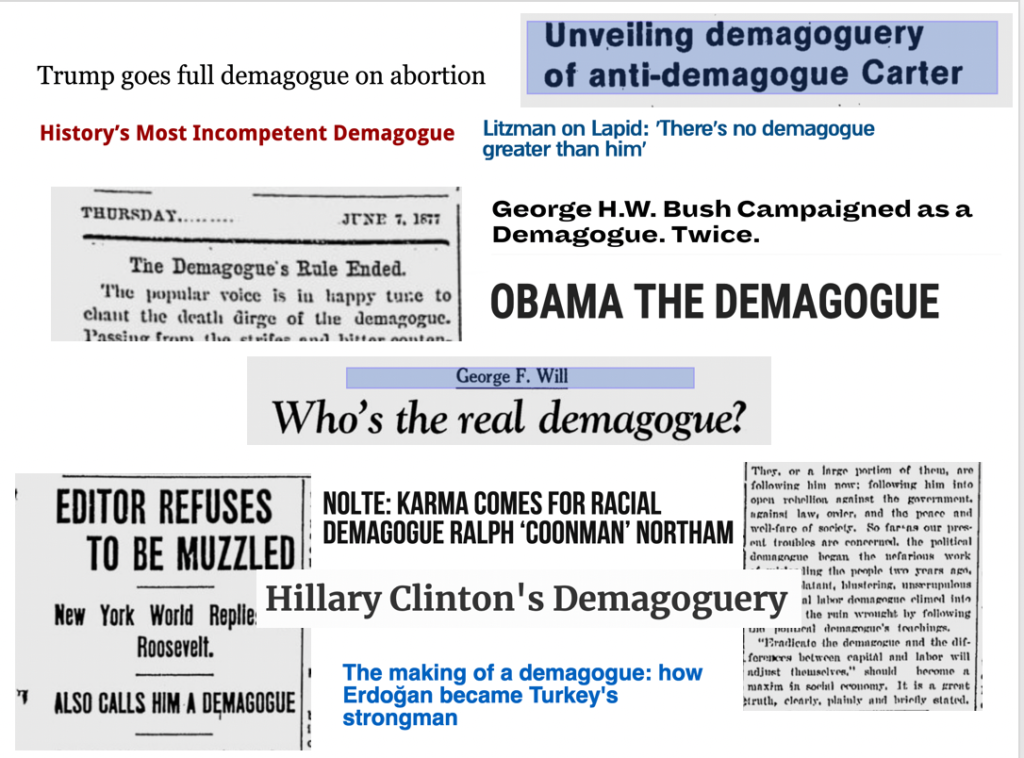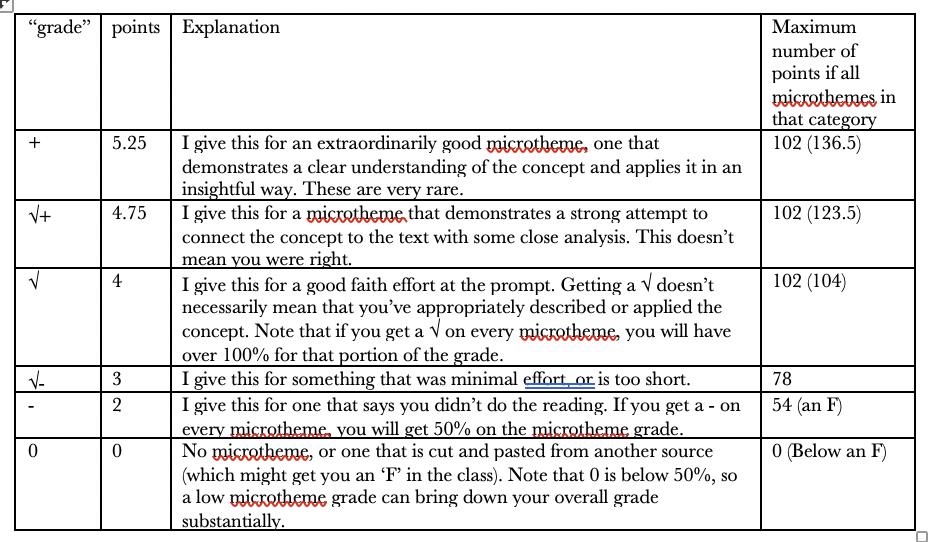
I often say that we should try to find the best opposition arguments, and so, when I’m trying to do that, there are some sites I tend to use. I wanted to post something about my sources, and then found I needed a fairly long explanation as to why I use these when I’m looking for the strongest argument for a policy, practice, or claim I think is wrong. There are two things I’m not doing–I’m not looking for “objective” or “unbiased” sources; I’m not looking for a representative sample from places along a continuum of party affiliation.
As I’ve argued, I think the left-right binary/continuum is nonsense (to the extent that it isn’t demagogically self-fulfilling), as is the notion of a binary of “objectivity” or “bias.” People who use terms like “objective” or “biased” can’t define them in a way that fits with research on cognition, and those terms are usually just what Burke called “ultimate terms.” A source might be very “biased,” in the sense of only including data that supports its argument, and yet all that data might be “objectively” true (that is, accurate representations of good studies and so on). I don’t think there’s any point in trying to find better ways to define objectivity or bias–I think we should just walk away from trying to find objective or unbiased sources, in service of a different goal.
A lot of discussion about sources is in service of the aspiration of The One Source on which we can rely. We have to abandon the comfortable fantasy of a source on which we can rely, a prophet with direct relation to The Truth. We all want clarity; we all want a source, author, ideology, perspective, in-group that guarantees us that what we believe is absolutely true. We all want to be able to believe rather than think. We are all suckers.
The fantasy of an objective source is unfortunately favorable to toxic populism in that both posit that there is some one perspective from which we might look at an issue that is the purely true one. Both rely on the false notion that, when we’re faced with deep disagreement, we should try to identify the group that has the Truth. If we find and join that group, then we will always be right, and we don’t have to think, but believe. Down that road lies demagoguery. If we believe that belief is enough, that there is an in-group that has a direct line to Truth, then we look for that group. And then we believe that only that (our) in-group has a legitimate policy agenda, and everyone else is spit from the bowels of Satan. And we start thinking that authoritarianism is a pretty good idea.
We all want to believe that our beliefs and behaviors are not just right, but the only possible way to think or behave. We pant after certainty the way my dog pants after squirrels. The difference is that he knows he hasn’t caught the squirrel, and we think we have.
If fyc, or any course, is to be a course in civics, then it means a course that teaches students how to recognize and resist that panting hope that, when we use this source, are a member of this group, (or whatever), we no longer have to worry that we might be wrong. We don’t need a course that tells us how to recognize when they are wrong, but when we are.
We shouldn’t worry that we might be wrong. That’s like worrying that water runs downhill. It does. We are. Just as, if we’re building a house, we have to take into account that water runs downhill, and plan for how we will manage rainwater, so we should acknowledge that we are always, if not actively wrong, then at least not seeing a situation from every possible point of view. We should also acknowledge that we, being human, think about the world through the lenses of cognitive biases. That water runs downhill doesn’t mean we have to lie on the ground and refuse to build a house; that we are all operating via cognitive biases doesn’t mean we have to lie on the ground and refuse to deliberate. There are ways that we can reduce the chances we’re wrong, and one of the most available and most straightforward, is to look at the best arguments that say we’re wrong.
If we believe that people disagree because we really disagree, (and not because everyone else is a benighted tool of a malevolent force) then we start looking for why people disagree. And it might be that some of the people who disagree with us are fools, stooges, psychopaths, or grifters–in fact, I think that it’s a given regardless of the issue and regardless of our position that some people on every point on the political spectrum are fools, tools, and so on (including us, from time to time)–but not everyone who disagrees with us is in one of those categories. And not everyone who agrees with us is an angel of enlightened and compassionate discernment. Because there are never just two sides to an issue.
And that’s why we need to find the best arguments that criticize our position, or argue for a policy we think is wrong-headed. Sometimes, we will find that even the best argument for some policy or candidate is incoherent, made in bad faith, profoundly dishonest, or not even good enough to be proven wrong. Not all arguments are equally good.
And this is where policy argumentation is a useful heuristic. If people are making a specific affirmative case for a policy we think is wrong-headed, and we read the best case for it, and it is wrong-headed, that doesn’t mean that our policy is right. Someone’s affirmative case (the plan for which they’re arguing) might be bad, and yet their negative case (what’s wrong with our plan) might be good. It also doesn’t mean that everyone who disagrees with us is wrong.
In my experience, we’ll often find that there are reasons and good enough arguments for positions, practices, ideologies, and groups other than ours. And, in my experience, we’ll often decide that, even though there are good enough arguments for a position, we still disagree. They’re good enough to be taken seriously, but not good enough to persuade us to change our mind.
What matters for the purpose of finding strong opposition arguments is: 1) if the source accurately represents the data (even if it is selective); and 2) if it is the best argument for that perspective.
I don’t think there is a two-dimensional way to represent our policy affiliations, so I talk about a spectrum. But even the metaphor of perspective is damagingly reductive. There are continua, but more than three, and some of those continua have more than one axis. I think it can be useful to talk about left v. right on some of those specific axes (e.g., social safety net), but not on all.
Here are what I think are some of the important axes in politics:
• Government regulation that promotes particular industries ( “pro-business government intervention”) v. free market [note that both of these positions would be considered “right-wing’]
• Government regulation that promotes safe, equitable, and ethical working conditions v. free market
• Government regulation that promotes safe, equitable, and ethical working conditions v. pro-business government intervention
• Interventionist foreign policy (intervention long before imminent existential threat) v. isolationism/pacifism (military action only for imminent existential threat)
• Interventionist foreign policy for purposes of promoting US businesses/economy v. interventionist foreign policy for ethical/moral goals (Wilsonian foreign policy)
• Support for a social safety net
• Epistemic libertarianism/authoritarianism: the extent to which someone believes that other points of view are legitimate points of view that should be heard; or, to put it another way, the extent to which people believe that there is an obviously good policy solution for every problem, and they know what it is
• Populism v. Pluralism: the extent to which one believes that there is one group that is real v. multiple legitimate points of view
• Populist Authoritarianism v. fairness: there is one group that is real, and all policies and practices should privilege that group v. procedural fairness
• Procedural fairness v. equity
• Regulations promoting reactionary v. progressive standards of “moral” behavior
• Naïve realist, reactionary, and demagogic hermeneutics of foundational texts (the US Constitution, Scripture, and so on) v. ….well, all others.
There are probably other important ways of thinking about various American policy preferences–this isn’t an exhaustive list. I just wanted to show that we really don’t have a binary of policy options or affiliations. I’m sure other folks could come up with lots of additional one (e.g., promoting environmental protection through nudges v. punitive regulation).
If we want, as teachers of argumentation, to get students to understand that our political world is not an existential and apocalyptic battle between Us and Them, then one way is to teach them how nuanced our policy commitments are—that they aren’t a binary or continuum. Just to be clear: there are people who want to destroy democracy and create a one-party state of people who have the pure ideological commitment. But those people are all over the political spectrum, and not everyone who disagrees with us is like that.
So, having said all that and given lots of caveats, here’s a list off the top of my head of sources I often use. I’ve given annotations on some, but not all. Again, my point is not to present this list as the definitive list that others should use, but to show what such a list might look like. Most teachers probably need to create their own, depending on their paper topics. For instance, if I had a lot of students writing about immigration, the list would be really different. A lot of sources on this list would be irrelevant, and I’d include some pro-union/anti-immigration sources, as well as some much more pro-immigration sources than anything I have on here. This list is intended to help others think about what lists they might give their students.
American Enterprise Institute. Reliably pro-GOP.
Cato Institute. Libertarian, reactionary.
Christianity Today. Conservative and moderate American Protestant Christian, conservative on social issues.
Council on Foreign Relations. Mixed.
The Economist. “Liberal” in the British sense.
Foreign Affairs. Interventionist, especially for business or military purposes, tends to be anti-Dem (but not always pro-GOP).
Foreign Policy. Interventionist for humanitarian purposes, tends to be pro-Dem (but not anti-GOP).
Guttmacher Institute. Reliable data on reproductive issues, generally pro-birth control, but not in ways that seem to bias the data.
Heritage Foundation. Almost always pro-GOP. Originalist on constitution. [Edited to add: I’m no longer recommending Heritage. They’re engaged in active dishonesty about CRT. If they’ll lie about that, they’ll lie about anything.]
Homeland Security. Government statistics on issues of immigration.
The Nation. Democratic socialist on economic issues, left on cultural/social issues, anti-interventionist on foreign policy, anti-GOP, often anti-DNC.
New York Times. Mixed economy on domestic, Wilsonian Foreign Policy, often anti-GOP and DNC (news articles strong, editorials problematic).
Pew Research Center. Reliable polling on various issues, transparent about methods.
Public Religion Research Institute. Reliable polling on issues of US religion.
Southern Poverty Law Center. Reliable information on hate groups of various political agenda, left on social/cultural issues.
Texas Observer. Specific to Texas, pro-immigration, social justice, equity, pluralist. (Texas Tribune is similar, but strives to be bi-partisan)
Wall Street Journal. Pro-government intervention for business/stock market in terms of both domestic and foreign policies; generally anti-Dem (news articles strong, editorials problematic).
Washington Post. Mixed economy on domestic, generally pro-Dem unless it bleeds, mixed on foreign policy (news articles strong, editorials problematic).




